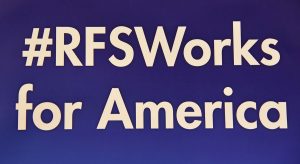 Eleven years ago today, President George W. Bush signed the expanded Renewable Fuel Standard (RFS2) into law with the Energy Independence and Security Act of 2007.
Eleven years ago today, President George W. Bush signed the expanded Renewable Fuel Standard (RFS2) into law with the Energy Independence and Security Act of 2007.
Since then, Renewable Fuels Association President and CEO Geoff Cooper says the United States has experienced cleaner air, greater energy security, revived economic activity in rural areas, and more affordable choices at the pump. “The RFS has unquestionably lived up to its promise,” said Cooper. “It has lowered consumer fuel prices, decreased reliance on imported petroleum, reduced emissions of harmful tailpipe pollutants and greenhouse gases, supported hundreds of thousands of jobs in rural America, and added value to the crops produced by our nation’s farmers.”
Among the numerous benefits since signed into law, the RFS has:
● Helped clean the air. The greenhouse gas emissions avoided from using ethanol has increased four-fold from 12.7 million tons CO2e in 2007 to 55 million tons CO2e in 2018. Carbon monoxide and particulate matter emissions are down as well, as is the concentration of ground-level ozone.
● Boosted energy security. U.S. dependence on imported crude oil and petroleum products fell from 58% in 2007 to just 14% in 2018, thanks in large part to growth in the use of ethanol and other biofuels.
● Lowered fuel prices. Because ethanol is priced below gasoline and far below competing octane sources, the RFS has led to lower gas prices for consumers. One recent study found ethanol reduces spending on gasoline by $142 per American household.
● Supported jobs and economic activity. Since enacted, the number of jobs supported by the ethanol industry has increased by 53%–from 238,541 jobs in 2007 to 365,491 in 2018. Additionally, the industry generates more than $40 billion in GDP every year.

